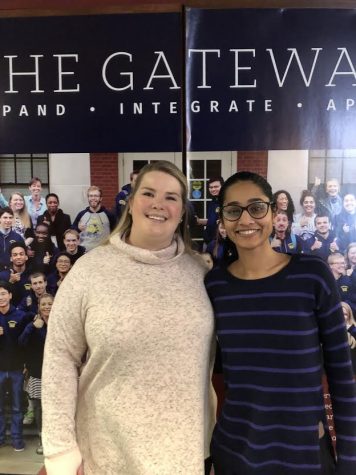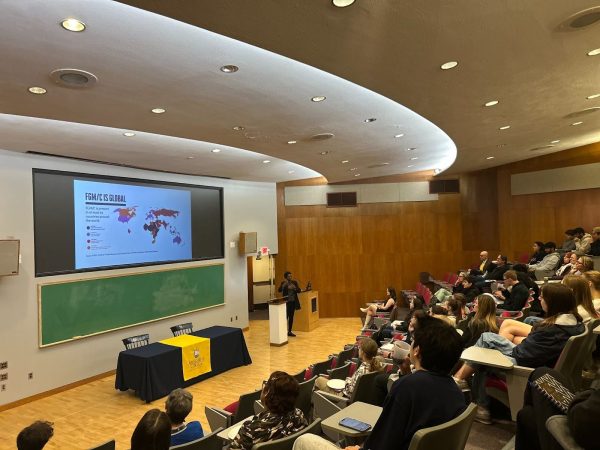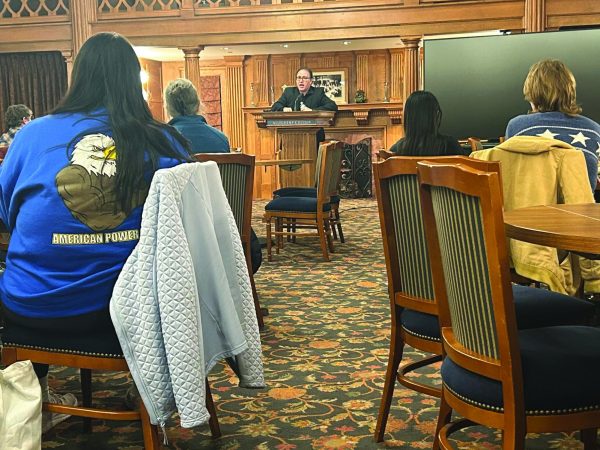Bonner program continues commitment to service
Civic Engagement welcomes Lang, Mohan to Allegheny Bonner Program
For 21 years, the Allegheny College Bonner Program has seen many new faces — from new service leaders to changes in administration. But one thing has always remained the same about the program — a commitment to service.
The program provides students an opportunity to serve for at least two years, including summers at a non-profit organization. While students are in the program, they commit to completing at least 900 hours, or about 8 to 10 service hours a week.

Olivia Lang, ’11, associate director of civic engagement and Bonner program director joined the college’s staff at the start of the fall 2018 semester, and Nicola Mohan, Bonner program coordinator, arrived in December 2018.
The Bonner Foundation is a national nonprofit, service-oriented organization which seeks to provide students of an underprivileged background with the opportunity to give back to their communities. In the 1980s, the foundation started reaching out to colleges to expand its mission by including college students. Since 1998, the program has been at the core of Allegheny College’s commitment to service.
“We had a lot of Allegheny students that were already very involved in the community and doing this type of service leadership work”, said Olivia Lang, ’11, associate director of Civic Engagement and Bonner Program director. The work became their work study jobs instead of volunteering, according to Lang.
Site placement is an important component that sets the program aside from other service-oriented initiatives, according to Lang. Instead of working at numerous places, Bonners are placed at one site for an extended period of time.
“We have, I would say, kind of a very gradual program, where your first semester you’re getting used to the academics, you’re getting more exposed to the Meadville community, to the Bonner community,” Lang said. And then in the second semester of your freshman year here you do a — it’s called a placement fair.”
To become a Bonner leader/scholar, applicants must have a commitment to community service, as well as go through an application process.
“When the students come in, usually the students coming into the program are already civically engaged — they have been since high school,” said Nicola Mohan, Bonner program coordinator for Allegheny College.
The application process not only accepts students into the program, but starts to get them acquainted to the program and what it stands for.
“I applied because they (Bonner) stand for good initiatives and I did a lot of service work in high school and I wanted to continue that in college,” Baneen Al-Akashi, ’19, said.
Al-Akashi has been part of the program since her first year at Allegheny.
“I would say in high school, it was more of an after school program you did once a week, where in college, it’s a site you work at 8 to 10 hours a week,” Al-Akashi said. You have a lot more leadership roles and connect more. It shows more of an impact in the work that you do.”
The goal of the program is to turn service as an extracurricular into a part of everyday life, both Lang and Mohan said.
Spending time in the Meadville community and responding to the needs of the community is a major objective of what the program. The program looks to fit the needs of the Meadville community, instead of forcing projects onto existing nonprofits.
“Our motto is person over project,” Al-Akashi said. We always try to put the needs of the community and the students on campus (first) and bring about their vision.”
Laura McClain, ’19, has been a Bonner for four years and now serves as the senior intern for the program. In her role, McClain is the main liaison between Bonner students and Bonner administrators working to coordinate events, program dinners and organize professional development events.
“I think the community of it (Bonner) has been fantastic,” McClain said. “When I was living and working in Meadville, the summer after my first year, I was working at a program that was not emotionally healthy. The boss was kind of a nightmare, but I would come home every night … and we would all make dinner together. It really got to be a bonding experience.”
The Bonner program gives students opportunities outside of just service. The program seeks provide an opportunity for professional development and personal growth.
“I would not be as outgoing if I would not have been in the Bonner program”, McClain said. “I spent my entire high school career hiding … then I got to Bonner.”
Being a Bonner service leader is about more than just service to the community, though. Becoming a Bonner is also about joining a larger group of current and former students that all have a shared background. Members of the program spoke of the “Bonner family.”
The Bonner network spans across more than 60 colleges in the United States, connecting students to hundreds of other current and former Bonners.
While many things have stayed the same in recent years, leadership of the program has shifted recently. Both Lang and Mohan are new to the Bonner program at Allegheny.
Lang began her work at the beginning of the fall 2018 semester, and Mohan joined in December 2018.
Lang, who was a Bonner while at Allegheny, most recently worked at the Office of Development and Alumni Affairs and obtained her masters degree in higher education. While a student at Allegheny, Lang was a student worker in the Civic Engagement Office.
Mohan comes to Allegheny from Miami-Dade County, where she was employed by Teach For America instructing 11th grade students in United States history. Mohan graduated in 2016 from the State University of New York at Geneseo with a degree in political science and women’s genders studies.
Many of the students involved in the program for years were saddened to hear that the two individuals who held the positions Lang and Mohan are now in had left the program.
“I didn’t want them (Lang and Mohan) to have a lot of pushback from the classes that were already here, just because they were new,” McClain said. “Having met with them and worked with them for the past semester, they have some really good ideas about moving the program forward.”
However, in spite of this change, both Lang and Mohan are excited about what they can bring to the program.
“I think the bigger thing for Nicola and I is that we’ve stepped into a very successful program … looking to kind of take it to the next level and how are we more strategic about their service work in the community and academic integrations,” Lang said.
Mohan also has broader visions for the program, specifically with what can be done with the students.
“For me, it would be building the Bonner community itself,” added Mohan.
As a new class of students enters the program, big changes are on the horizon for the Bonner program. However, students and administrators will continue to provide a valuable service to the community and the College, according to Lang.







